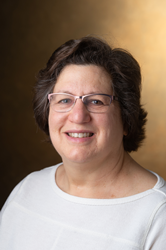
SIUE’s Luci Kohn, PhD, professor in the Department of Biological Sciences.
“This skeletal collection, coupled with the depth and detail of family and demographic data for each individual, provides a unique opportunity to assess skeletal and dental characteristics over time, as well as family and environmental differences in health, longevity, and age-related conditions.”
EDWARDSVILLE, Ill. (PRWEB)
May 29, 2020
The Rhesus Monkey (Macaca mulatta) colony at Cayo Santiago, Puerto Rico is one of the world’s most useful primate resources in biomedical and anthropological research. Established in 1938, the colony provides a unique opportunity to study health history, and genetic and environmental effects on bone and tooth development, aging, and pathology.
Southern Illinois University Edwardsville’s Luci Kohn, PhD, professor in the Department of Biological Sciences within the College of Arts and Sciences, has joined a multi-institutional team of distinguished researchers to study this colony in order to advance translational research in human diseases. The team is led by principal investigator Qian Wang, PhD (Texas A&M), and includes Kohn, Debbie Guatelli-Steinberg, PhD (The Ohio State University), and Qiang Zhao (Mercer University).
The group has been awarded $791,363 from the National Science Foundation (NSF) to conduct a four-year integrated study of effects of family, environment and age-related information on skeletal data. The Cayo Santiago colony is the source of a rare skeletal collection containing at least eight generations of information about individual monkey’s sex, age and pedigree.
“Our primary objective is to develop and use this integrated assessment of the effects of environment and family lineage on the development and health within the colony’s Rhesus Monkeys,” Kohn said. “Our team brings together expertise in biology, anthropology, biomedical sciences and computer sciences. My research on skeletal morphology, quantitative genetics and evolution contribute to the foundations of this project.”
Details such as bone dimensions, bone density, tooth eruption, body mass, and observable disease conditions will be cataloged and added to the previously available details of sex, birth and death dates, parentage, and social rank for each monkey. Once reliable colony history and environmental history are reconstructed, patterns of variation in development and health will be studied in a contextualized manner to reveal environmental and familial influences.
The team will accomplish this task by conducting an original family-based osteo-oral health and pathology study to reconstruct health status within the skeletal collection. After these patterns are revealed, the team hopes to provide a non-human primate model to be used in anthropological and biomedical studies for studying human adaptability and fragility under varied living conditions.
The skeletal collection will serve as a model for the team to study multiple health conditions that have been caused by the familial and environmental influences. Among the conditions to be studied are age-related diseases such as osteoporosis and osteoarthritis, two of the most devastating conditions of our aging human population.
“Cayo Santiago, sometimes referred to as “Monkey Island” has been continuously inhabited by rhesus macaques since 1938,” Kohn explained. “The colony was established with 409 macaques, and approximately 1,700 monkeys currently live on the island. It is managed by the Caribbean Primate Research Center (CPRC), and island residents are provisioned with food and fresh water.”
According to Kohn, detailed data on island residents has been recorded since approximately 1955. Monkeys are free-ranging on the island and form their own family and social groups. Once residents die of natural causes, their skeletal material is incorporated into the CPRC museum collection.
“This skeletal collection, coupled with the depth and detail of family and demographic data for each individual, provides a unique opportunity to assess skeletal and dental characteristics over time, as well as family and environmental differences in health, longevity, and age-related conditions,” Kohn noted. “At least four major hurricanes, including Maria in 2017, have struck the island since the colony was established. The effects of major hurricanes on rhesus monkey development will be assessed. Questions of development and aging are related to the human condition, which cannot be equally assessed in human populations.”
The team’s studies will incorporate undergraduate students interested in careers in medicine, dentistry, veterinary science and biomedical research.
“Students will be integrated into all phases of these studies, providing unique scientific and cultural experiences,” Kohn concluded. “Students will help in data collection in Puerto Rico, data analysis at our home institutions and dissemination of results at professional meetings.”
By preparing the next generation of leaders in a knowledge-based economy, SIUE’s Graduate School fulfills the region’s demand for highly trained professionals. Graduate school offerings include arts and sciences, business, education, engineering, nursing and interdisciplinary opportunities. SIUE professors provide students with a unique integration of theoretical education and hands-on research experiences. Students can obtain graduate certificates or pursue master’s degrees, and be part of a supportive learning and rich intellectual environment that is tailored to the needs of adult learners. The Graduate School raises the visibility of research at SIUE, which ranks highest among its Illinois Board of Higher Education peers in total research and development expenditures, according to the National Science Foundation. Doctoral programs are available in the Schools of Education (EdD) and Nursing (DNP). The School of Engineering and the Department of Historical Studies feature cooperative doctoral programs (PhD), and the College of Arts and Sciences features an Environmental Resources and Policy cooperative PhD.
Share article on social media or email:

